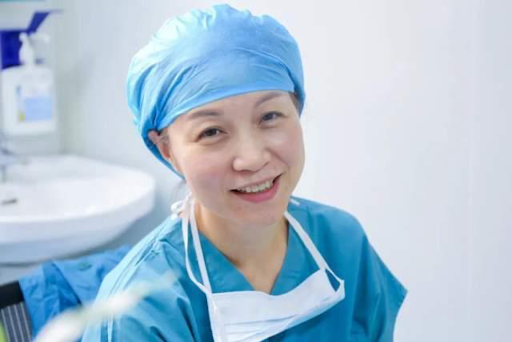Dr. Han: Blood, Sweat, and Perseverance on the Pandemic Frontlines

Dr. Lichun Han prepares for surgery following a morning consultation.
Medicine is not only difficult during the study process, but also physically and mentally difficult in practice. To be a good anesthesiologist requires sound thinking, a stable heart, and perseverance during stressful situations.Eyebrows knitted in concentration, Lichun Han sits at the front of a long oval table, discussing stacks of files and papers with her coworkers – on the table for the morning, a gastrointestinal endoscopy procedure that requires calculation of propofol amount, various pediatric oral procedures needing local anesthesia, and a larger operative liver transplant. The room and hallways outside rustle with noise and the beeps of a hospital, though the scenes outside the window are still dark. In her role as chief physician and director of the Department of Surgical Anesthesiology at Daxing Hospital in Xi’an, China, it is not unusual to see Dr. Han beginning work before the sun has risen, both in her home hospital and in Wuhan in early 2020, where she assisted in COVID-19 pandemic aid efforts as part of an emergency Chinese medical team.
In an online interview in August 2021, Dr. Han shared her experiences as a medical worker in general and during the pandemic, providing insights into the challenges and positive elements of the profession.
What does your typical work day look like?
My daily work is very busy. The morning shift begins at 8am, and at 7am (or before) we begin with case analysis. After handing over the shift, we will each enter our respective operating rooms for anesthesia induction. My task at this time is to assist colleagues with any special or critical cases. Our work is needed everywhere in the hospital for pain-free treatment; I take part in cross-department discussions, make outpatient consultations, and make rounds in wards to monitor patient circumstances.
What motivated you to pursue anesthesiology?
I’ve wanted to become a doctor since middle school. Because I studied general medicine in medical school, I had many career options when I finished and actually randomly chose anesthesiology. I soon realized that I enjoy the profession, because it is challenging and has improved my resilience during stressful events.
Can you describe your experiences on the COVID-19 front lines?
I arrived at Wuhan Union Hospital on February 2, 2020 as a member of the second medical aid team to Wuhan. Our team worked in Union Hospital for 65 days- we stayed the longest time of any medical team. Because our treatment ability was effective and the mortality rate was low, our team was kept until the end, up until one day before the lifting of the full lockdown in Wuhan. I was responsible for treatment of critically ill, intubated patients in the ICU.
During your time in Wuhan, what did you find most difficult, challenging and rewarding?
The greatest challenge was not actually physical lethargy, but psychological stress. Because the beginning stages of the epidemic were particularly tense and the future was uncertain, there was great pressure on everyone. We would question if we really had the ability to help patients with the disease. We felt helpless and scared that we would be infected. However, our strong teamwork and love for each other was key to overcoming these challenges.
What do you view as your most impressive accomplishments, both professionally and otherwise?
An accomplishment of mine is that, as a woman and mother, I have made a place for myself in the anesthesiology profession. This has not been easy. Although I have the same requirements and standards as men in my line of work, as a mother, I devote more time to taking care of my family and children. Within my professional career, the experience that has left the most impression on me was my time aiding in the fight against the pandemic in Wuhan – a rare and valuable learning opportunity.
Do you have any advice for someone who wants to pursue a medical career?
Anyone who wants to enter medicine must first mentally prepare themselves for the process. The speed at which the field of medicine develops is tremendous, so you must commit to lifelong
